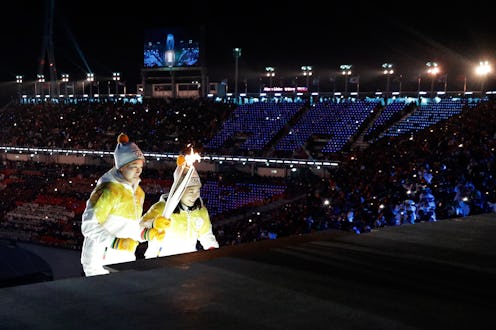News
The 2 Women Who Carried The Olympic Torch Represented A Symbolic Message Of Peace

In a historic moment of unity, two women who play on the unified Korean ice hockey team carried the Olympic torch for the last leg of its journey at the opening ceremony for the 2018 PyeongChang Games. Park Jong-ah of South Korea and Jong Su-hyon of North Korea carried the flame together across the stage and up a steep flight of stairs to the base of the Olympic cauldron.
And in the role of final torch bearer, figure skater Yuna Kim lit the torch itself in Pyeongchang's Olympic Stadium. In 2010, Kim won the gold medal for figure skating in Vancouver, and became the first South Korean to medal at all in the event. After winning the Olympic silver medal in 2014, Kim retired from figure skating and became an official ambassador for the 2018 PyeongChang Olympics.
In its 100 day journey through South Korea, the torch was carried by no fewer than 7,500 bearers. The first to welcome the flame to South Korea were retired figure skating champion Yuna Kim and Prime Minister of the Republic of Korea, Lee Nak-Yon. It's been carried since by many of South Korea's best and brightest, including You Young, South Korea's 13-year-old figure skating wunderkind. And in a first-ever for the torch relay, a humanoid bot that goes by HUBO carried the torch as well.
The PyeongChang Olympic torch relay also marks the fastest leg ever completed on land, as the flame caught a ride on South Korea's high-speed KTX train.
The tradition of carrying the Olympic flame from Greece to the varied far-flung hosts of the games dates back to 1936. That history continues in 2018, as thousands of torch bearers bring the iconic flame from Olympia to its ultimate destination in PyeongChang, South Korea.
The legendary relay begins in the games' birthplace — Olympia. The flame is ignited by using a parabolic mirror to harness and magnify the sun's rays (in order to ensure the "purity" of the fire), and is then transported in a transnational relay involving thousands of carriers.
While the Summer Games stuck with this route from the get-go, the Winter Games have only followed this Olympic torch path since 1964. Before that, the Olympic torch did not always originate in Greece. Alternative flame inceptions included Italy, Norway, Germany, and Switzerland.
The history of the Olympic torch relay actually began in 1931, with an idea hatched by Carl Diem, a German sports administrator and secretary general of the 1936 Olympics. Diem wanted to connect 1936 Berlin with the legendary Olympics of old, and conceived of a torch relay to bring the mythical Athenian flame to Germany.
While the ancient games featured a flame, there was no relay.
But the 1936 Olympics are not primarily remembered for instituting the Olympic torch relay. Rather, they're notoriously known as the "Nazi Olympics."
Joseph Goebbels, the propaganda minister for Hitler, convinced the new dictator to not only indulge the Olympic games, but to use them as a megaphone for Nazi propaganda.
Diem's torch relay fit frightfully well within Nazi ideology. Nazis were anxious to link their Aryan ethnicity with that of the ancient Greeks, and connecting the two peoples with an uninterrupted, continent-crossing Olympic flame was an obvious way to do so.
The inaugural torch relay includes other disquieting facts. The original flame holders were made by the same arms manufacturer that would later supply the Nazis with machine guns in WWII. And as the flame crossed eastern Europe, Nazi sympathizers in Austria, Bulgaria, Czechoslovakia, and Hungary would shout "Heil Hitler."
Diem himself was not officially affiliated with Nazism. His wife was Jewish, and he hired Jewish employees. But he did accept patronage from the Nazi party, and allowed his vision of an inspirational torch relay uniting the ancient and modern games to be coopted by a monstrous regime. (Swastika flags were ubiquitous along the torch's Berlin route.)
World War II put the Olympics on a 12-year hold, but the games returned in 1948 to London — and so did the torch relay. Since then, despite its troubling roots, the relay has both inspired and unified countless participating individuals and nations.
As TK gets set to/lights/lighted the final torch at Pyeongchang's Olympic Stadium, that redemptive history will be/is/was on display. TK